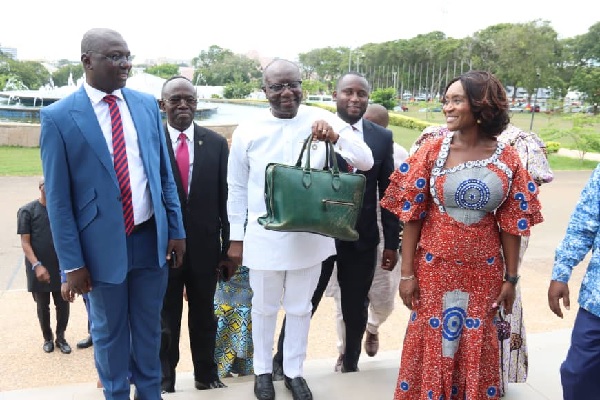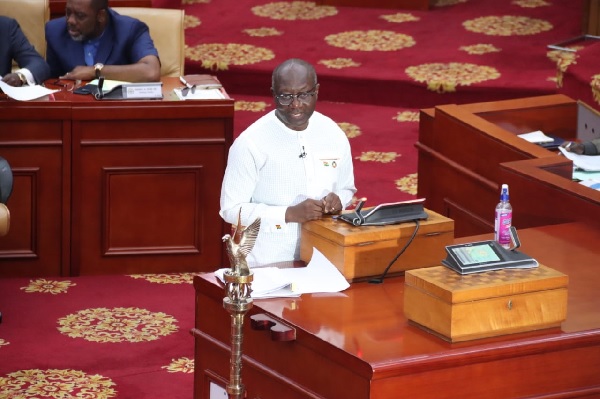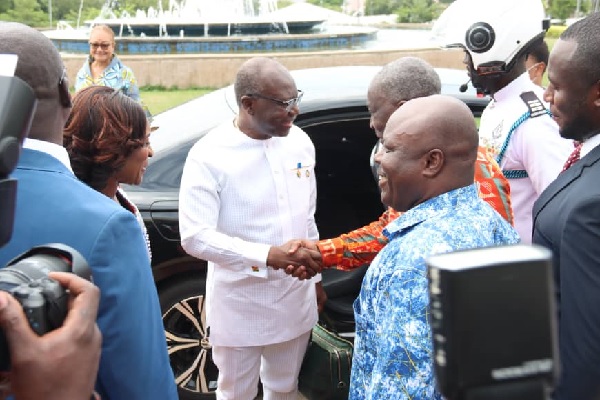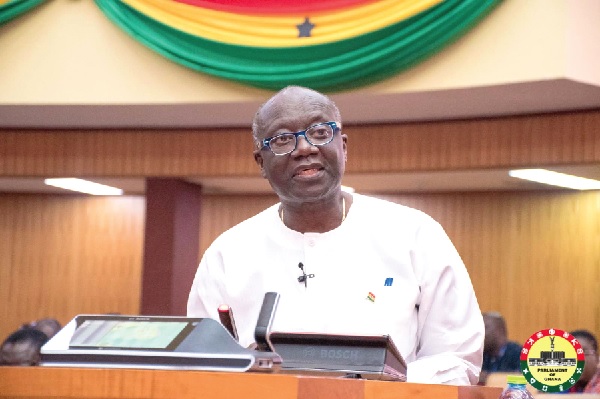Below are key highlights of the 2024 Budget, which seeks to advance Ghana on the path toward fiscal consolidation, macro stability and growth
- Inflation is expected to remain within the IMF programme’s Monetary Policy Consultation Clause (MPCC) of 29.4 percent, with a symmetric band of 4.0 percent at the end of 2023, an end year target of 15% in 2024 and trend further down to the medium-term target band of 8±2 percent by end-December 2025. A tight monetary policy stance, favourable base drifts, relative stability on the foreign exchange market, and a favourable food harvest are expected to
outweigh inflationary pressures over the near-term. - The Bank of Ghana has maintained the tight monetary policy stance to firm up the disinflation process. Among other measures, the Bank has further raised the monetary policy rate by a cumulative 300 basis points (bps) in the year to September 2023 to 30 percent. In the outlook, monetary policy in 2024 and the medium-term will aim to regain price stability.
- NonOil Real GDP is projected to slow down from an estimated 2.8 percent in 2023 to 2.1 percent in 2024 and pick up to 5 percent by 2027 giving an average growth rate of 4.1 percent over the 2024-2027 period.
- In the real sector, we expect Overall Real GDP growth to increase from an expected 2.3 percent in 2023 to 2.8 percent and reach 5 percent by 2027. This yields an average growth rate of 4.3 percent over the 2024-2027 period.
- In the difficult economic challenges, we paid 15 percent 19 Cost of Living Allowance (COLA) for 6 months in 2022 to cushion 949,122 workers, some 50 percent more than 2016.
- All workers were paid full wages and salaries and on time, even when revenues plummeted during the
COVID-19 Pandemic. - As a Government, we have always been committed to protecting the quality of life of our people. Total Wages and Salaries for workers has increased from GH¢14.7 billion in 2016 to GH¢37.5.
- Government recognises the constraints our medical personnel face in providing health care for our citizens. With the passage of the Exemptions Act, Government will engage the Ghana Medical Association on waivers for importation of vehicles to ease the transportation burden of our doctors. This policy will enable them to deliver quality and timely healthcare.
- The Tripartite Committee has concluded negotiations on the National Daily Minimum Wage. The tax-free portion of the Individual Income Tax rates will accordingly be adjusted to take care of the change.
- This approach will make it easier for taxpayers to fulfil their tax obligations to the State.
- A simplified tax return will be introduced as a means of promoting voluntary compliance as part of the modified taxation scheme for individuals in the informal sector.
- The bands subject to ad valorem taxes will be expanded while the specific rates will be reviewed upwards.
- The Stamp Duty Act, 2005 (Act 689) has not been reviewed since its enactment in 2005. To realign the rate with current economic realities, Government, in 2024, will review the rates and fees for stamp duties.
- To address the negative externalities of plastic waste and pollution, Government will review and expand the Environmental Excise Duty to cover plastic packaging, and industrial and vehicle emissions.
- A VAT flat rate of 5 percent to replace the 15 percent standard VAT rate on all commercial properties will be introduced to simplify administration.
- Grant exemptions on the importation of agricultural machinery equipment and inputs and medical consumables, raw materials for the pharmaceutical industry;
- Grant import duty waivers for raw materials for the local manufacture of sanitary pads;
- Zero rate VAT on locally produced sanitary pads;
- Extend zero rate of VAT on locally assembled vehicles for 2 more years;
- Waive import duties on semi-knocked down and completely knocked down Electric vehicles imported by registered EV assembly companies in Ghana for a period of 8 years;
- Waive import duties on import of electric vehicles for public transportation for a period of 8 years;
- The following reliefs have been prioritised for implementation: Extend zero rate of VAT on locally manufactured african prints for two (2) more years;
- However, I assure this August House, that we have heard, we believe in lower taxes for industry, and we are working at this aggressively with the GRA and to be cemented with the standing committee of the Mutual Prosperity Dialogue.
- In that regard, it is difficult to implement all the structural reforms and tax reliefs needed to immediately lower and/or eliminate certain tax handles.

- It is important to note that in the short-term, fiscal sustainability requires that we improve our tax ratios significantly otherwise, our long-term competitiveness will be eroded. As we all know, our country's 13 percent tax-to-GDP ratio is far below our peers. Our target is 18-20% and we are on course.
- Our approach to tax policy since 2017 was to give significant relief to the private sector until expenditure pressures from 2020 required a more aggressive approach.
- To address these challenges, Government is reviewing the overall structures and processes to determine the optimal way forward. In the interim, Districts will resume collection until these challenges are resolved.
- Despite these achievements, the initiative has encountered some challenges thus making it difficult for the relevant bodies including the Metropolitan, Municipal and District Assemblies to have access to their share of the property rate collections on time.
- Bills are currently available online for properties that have been successfully identified.
- Similarly, the identification of registered persons and entities associated with billable properties has
increased by 831 percent, from 186,542 to 15.68 million. - The number of billable properties has seen a substantial increase, with a pre-2023 count of 1.3 million
properties escalating to 12.42 million representing an 856 percent surge in properties identified that can now be properly billed. - The objective was to develop a unified common platform capable of billing, collecting, and reporting
property rates nationwide. - Acting through the Ghana Revenue Authority (GRA) as per Section 4 of the Ghana Revenue Authority Act, 2009
(Act 791), introduced the property rate reform project. - Based on the estimates for Total Revenue & Grants and Total Expenditure (including arrears clearance), the overall Budget balance to be financed is a fiscal deficit of GH¢ 61.9 billion, equivalent to 5.9 percent of GDP.
- The potential interest rate saving from the ongoing external debt operation will further bolster public finance sustainability.
- This large decrease comes from the combination of fiscal consolidation efforts of 4.9 percentage points of GDP, reflecting an adjustment in revenue by 1.0 percentage point and primary expenditure by 4.0 percentage point of GDP.
- Total Expenditure (commitment) is projected at GH¢226.7 billion (21.6 percent of GDP). This projection reflects a reduction of 6.1 percentage points of GDP in total expenditures (commitment basis) relative to the outturn in 2022.
- Total Revenue and Grants is projected at GH¢176.4 billion (16.8 percent of GDP) and is underpinned by permanent revenue measures largely Tax revenue measures amounting to 0.9 percent of GDP.
- The disruptions in energy and food prices, and efforts to combat record-high inflation through tightening global monetary policies, have considerably slowed down economic activity globally.
- Global economic recovery remains sluggish primarily due to a confluence of setbacks, including the lingering effects of supply-chain disruptions and geopolitical events, and the increasing cost of living across many economic blocs.
- That is the promise of this Budget. And we will keep our eyes firmly fixed on the future and build lasting prosperity for this and the next generation.
- As the agreed host of the Climate Vulnerable Forum (CVF) Secretariat, we are galvanising the coalition of 68 nations and 1.7 billion people to shape the climate discourse and secure resources for a just energy transition.
- Today, our country hosts the headquarters of the AfCFTA. We also have a privileged position in leading the climate change charge.
- We are also positioning a generation of Ghanaians to secure our leadership in the global arena.
- Ultimately, our ambition remains to build an entrepreneurial nation and create an additional minimum of 1 million jobs for the Ghanaian youth over the near-term. We have done this before with 2 million jobs in years, but we must move faster.
- Office space has already been secured. Our goal is to realise Ghana's potential to become a global BPO powerhouse,
employing over 250,000 Ghanaians over the next few years. - YEA is about concluding negotiation with CCI, the business process outsource (BPO) operator in sub-Saharan Africa
for the establishment of a call centre that can see the direct creation of 20,000 local jobs for our young graduates. - In this view the Ministry has teamed up with MIDA and in committing GH¢1 billion to ensure that our Enclave project
for import substitution is successful. - Indeed, given the potential to upscale and the multiplier effects that our small and medium-sized businesses possess, Government intends to scale up support to young entrepreneurs and fledgling businesses, with a singular aim to create
sustainable jobs across all communities. - We will, through the Ghana Mutual Prosperity Dialogue, be intentional about collaborating with the private sector and our development partners to support local businesses attract FDI and enhance the economic prospects of our people.
- We will continue to invest in on-going projects, and on the external front, we will conclude negotiations with the Official Creditor Committee to ensure that work on eligible externally funded projects resume.
- Ghana has paid its dues, has turned the corner, and getting back on track. Despite these successes, we have to do more to reinforce our stability and guarantee decent jobs with good pay for the young people. As such, through the 2024 Budget, we will deliver even more investment across the real sector to place our economy on a firm growth trajectory that will create more jobs, safeguards our climate prospects and deeply entrench Ghana as the seed country for Africa’s development renaissance.
- THe government has also invested GH¢1.7 billion in the National Identification Scheme to ensure that 17.5 million eligible Ghanaians acquire security-sensitive ID Cards. This has laid the foundation for a prosperous future where
digitalisation provides more convenience, introduces an added layer of efficiency in delivering public services, and enhances our ability to safeguard Ghana's national interests. - The 2024 Budget will set out the broad medium-term policy framework underpinning our approach towards recovery
and stability with growth. - We will cross the GH¢1 trillion Gross Domestic Product (GDP) mark for the first time in our economic history.
- Ghana's economy under President Akufo-Addo's final year in office is projected to be valued over GH¢1
trillion in 2024 from the GH¢219.5 billion in 2016.

- With such a milestone ahead of us, Government is protecting, at all cost, the foundation for sustained economic expansion. A foundation that has been achieved through the sweat and patience of the Ghanaian people.
- We pledge to protect this for all our people and especially for private sector growth. And we shall do so by ensuring that the enabling factors are in place and accessible to all. These will include reliable energy supply, stable Cedi, lower
inflation and lower interest rate regimes, access to private sector credit, infrastructure provision, food security, national security, and inter-continental market linkages through increasing active platforms such as the AfCFTA.

- Over the past 7 years: Every sector has been positively impacted. Every household has been positively impacted by our social intervention programmes. And Every region has also been positively impacted.
- Indeed, President Akufo Addo has deepened decentralised development by investing GH¢422.1 million
to create and resource six new administrative regions. The most in our history since independence. - Consistent with our policy on preferential options for the poor, i.e. leaving no one behind, we have been historic in enhancing social mobility and protected the vulnerable in our society.
- In this regard, we have since 2017: improved access to quality SHS education for about 5.7 million Ghanaians by investing GH¢8.4 billion in the future of our next generation;
- Increased enrolment and learning outcomes of 3.8 million pupils by
investing GH¢3.6 billion in the School Feeding Programmes; - Reformed the NHIS to improve and expand health service delivery to 16 million Ghanaians.
- Supported foundational education of over 6 million pupils by investing GH¢248.5 million as Capitation Grants; and improved the quality of life of about 350,000 Ghanaian households under the LEAP by investing GH¢1.2 billion.
- We made all these investments into social mobility, not just because it was the right thing to do morally, but also because we believe it is economically essential to uplift and extend opportunities to every Ghanaian household.
- We are confident that the record high investments we have made and continue to make over these seven years in preparing our children for a brighter future will significantly transform our society, especially by tackling the
root cause of poverty that has afflicted many families from generation to generation. - We are determined to do more to boost the capacity of the private sector to expand productivity and create jobs.
- In the past 7 years, we have: Invested GH¢32.7 billion to keep the lights on and support the growth
of businesses; - Invested GH¢25.3 billion to facilitate the repositioning of the financial sector and enhance its ability to assist business operations. To date, the Development Bank Ghana has facilitated GH¢1 billion in competitive financing for the private sector, and GIRSAL continues to mitigate risks in the agriculture sector;
- Supported 100,000 young graduates to secure workplace experience and employment by investing GH¢2.4 billion in NABCO;
- Invested GH¢7.1 billion to build road and transport infrastructure to improve connectivity and productivity;
- Invested GH¢541.5 million in 169 1D1F enterprises to scale-up valueaddition and provided 140,000 additional jobs; and
- Created over 2.3 million jobs in the private and public sectors (approximately 900,000 in the private sector and 1.4 million in the public
sector). - Capital spending is equally important to the future of our country, consequently we mobilised and deployed resources to: Expand the railway network, including connecting Tema to Mpakadan to promote trade on the Eastern Corridor;
- Construct 12 fish landing sites and two (2) fishing harbours at a cost of GH¢19.5 million to promote the fishery-based livelihoods of our coastal folks;
- Improve community infrastructure by investing GH¢2.2 billion into over 2,000 projects under the IPEP initiative;
- Promote inner city development by spending GH¢190.3 million under the Zongo Development Fund; and
- Expanded and improved the road network by investing about GH¢16 billion. Recording the most kilometers of roads and interchanges done in our history.
